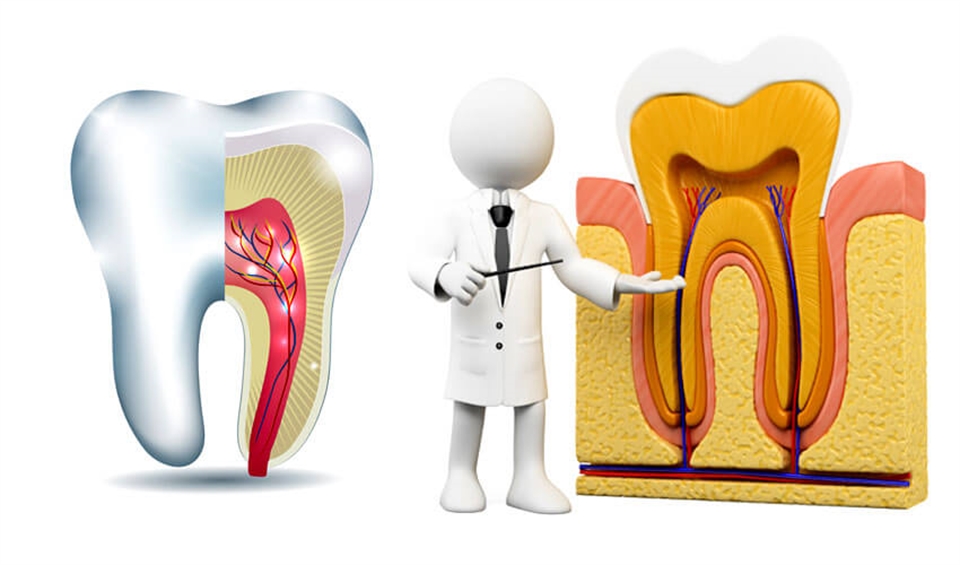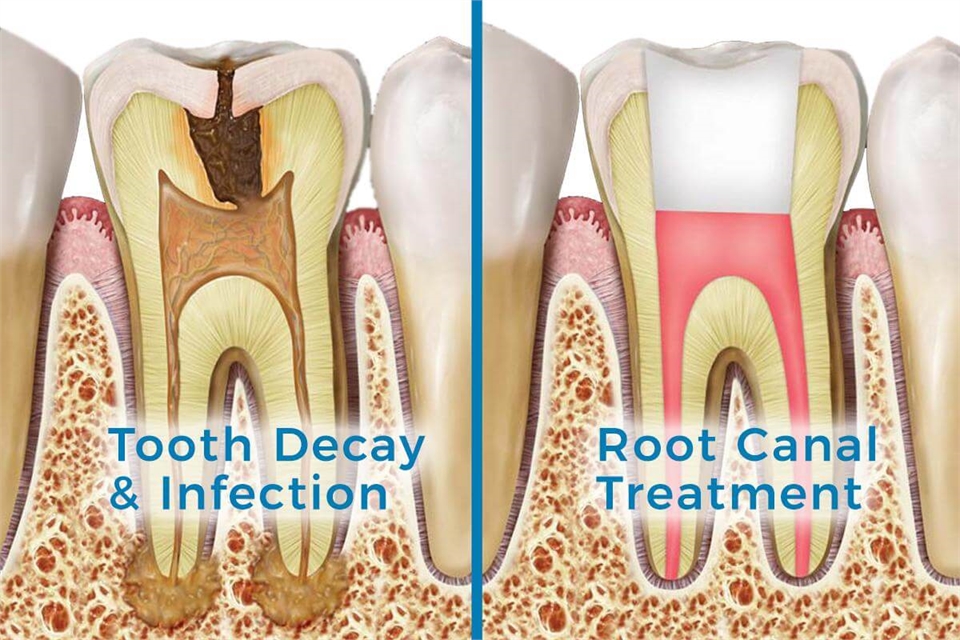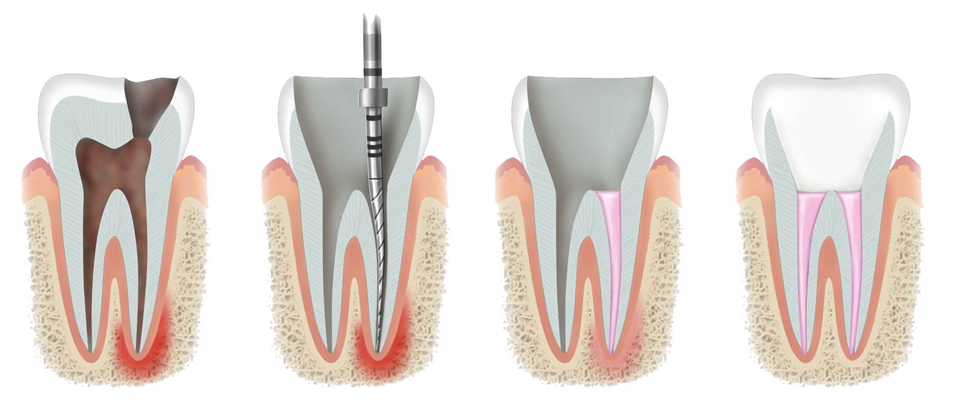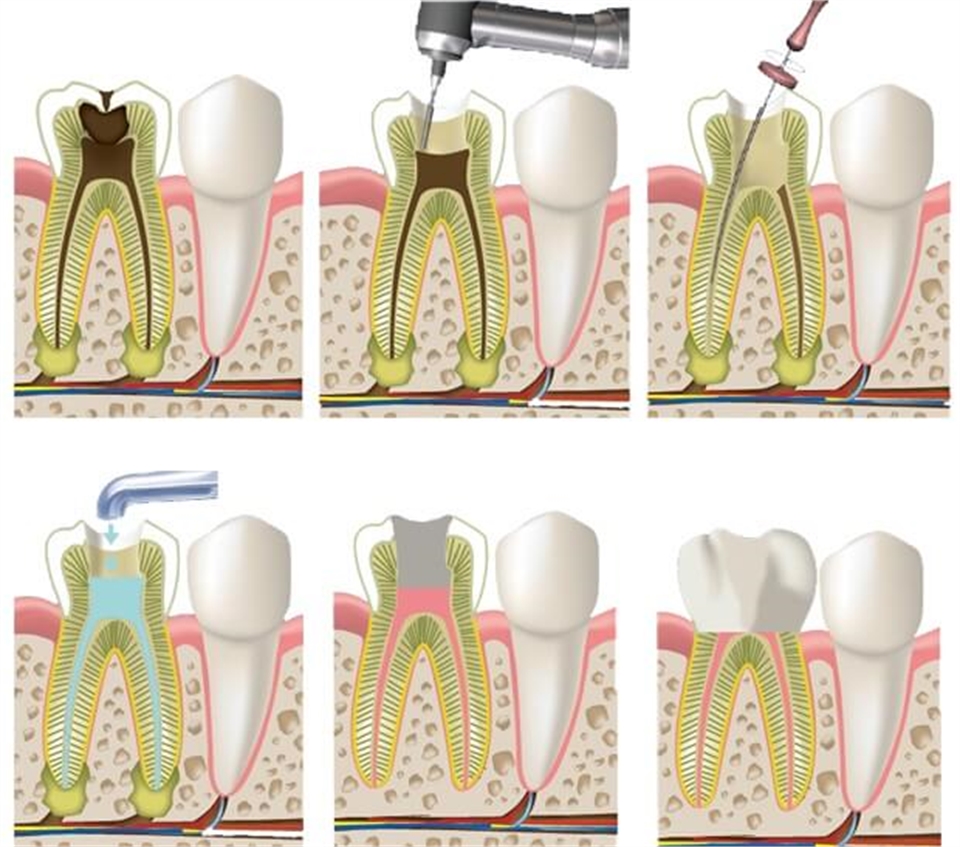Endodontist for emergency root canal treatment in London
If you have a dental abscess our root canal specialists will help you save your tooth. Prime location in central London

Root canals have a bad reputation, but they’re one of the best preventative treatments in dentistry. They can save a badly infected tooth from being symptomatic and help keep a natural tooth alive and functioning the mouth for many years.
For most people, a root canal is something that comes on gradually. You’ve got tooth decay, followed by slight sensitivity in the tooth, then the pain gets unbearable and you finally book an appointment. But there are times when it can be necessary to get a root canal sooner, rather than later, even if the tooth is not painful at this time. Doing this procedure earlier will prevent an urgent trip to the accident and emergency department (A&E).
The root canal process
In a root canal procedure, a small hole is drilled into the tooth. A dentist then uses a series of fine tools to remove the inner soft tissue of the tooth, known as the “dental pulp”. This structure compounds of blood vessels, connective tissue and nerve of the tooth. When the tooth nerve gets irritated due to an inflammatory process it gets painful.
Once the pulp has been cleared, the now-empty space is filled with a biocompatible material to prevent re-infection and return integrity to the tooth. After the root canal therapy has proven to be successful the tooth is restored with a filling or crown.
When is an emergency root canal needed
Infected teeth can be much worse of a problem than people think. If the bacteria in a tooth are allowed to continue growing and multiplying, they will eventually start to decay the bone around the tooth as well. An infected tooth can affect the overall body condition since all the organs are interconnected. Increased bacterial number caused by non-treated tooth can cause issues for the rest of the dentition.
An emergency endodontic treatment lasts about 30-40 minutes. The initial treatment starts with relieving the symptoms and getting rid of the pain. Depending on the type of infection developed this could be draining an abscess or removing severely irritated dental nerve.
Signs that you need to get an emergency root canal to treat the problem immediately include:
- Throbbing pain in the tooth
- Tooth and gum pain simultaneously
- A dental abscess or hard lump in the gum tissue
- Pain when eating or drinking
- A tooth that is sore to touch
- A tooth that has gone grey or black
- Fractured teeth, where the fracture goes through the pulp chamber
- Expulsed teeth, which are re-implanted in the socket
All of these indicate there is a severe problem that must be addressed promptly.
What if you ignore the symptoms?
As we said, infection in a tooth is a serious concern. The tooth itself will need to be extracted if a root canal isn’t performed. In the worst-case scenarios, the bone around the tooth will start to degrade forming a large area of pus collection.
Bacteria from the mouth can also get into the bloodstream and increase the chance of severe cardiovascular problems, or complications during pregnancy. It truly cannot be overstated how important oral health is to the overall health of your body.
Our clinic has an emergency endodontist able to book you in straight away in case of an emergency. Don’t put up with pain and don’t risk your health. If you notice any of the signs of severe tooth infection, contact us about an emergency root canal today.
If you happen to be in an emergency need of treating your abscessed tooth give us a ring and we will book you in straight away. We provide 24-hour service for painful teeth and patients in need for emergency dental procedures. An endodontist is available during the night, weekends and bank holidays.
FAQ about root canal treatments
What is the alternative to the endodontic treatment?
The alternative to the root canal therapy is tooth extraction.
My tooth is painful. Does that mean I will need a root canal?
No. Pain can be caused by many factors. The dentist will take an x-ray and examine the painful area.
My tooth feels sore even if I touch it with the tongue. Will I need a root canal treatment?
Most probably you will.
There is a blister over one of my teeth. What is it caused by?
This is a dental abscess. The infection is caused by bacteria multiplying inside the tooth. Root canal treatment is strongly recommended.
Is root canal treatment painful?
It is not completely painless. You can feel slight sensitivity during the procedure, but it is not real pain. Anesthetics provide deep numbness of the area.
How many visits do I need for an endodontic treatment?
It depends. It can be done in one appointment, but root canal treatments in two or three visits have a better success rate.
Does the root canal treatment remove the roots of the tooth?
No, it cleans the canals, which are situated inside the roots.
How long will a root canal treatment last?
A successful root canaled tooth will last you 12 years on average.
What is a surgical root canal treatment?
It is called apicectomy. The tip of the root is surgically removed to eliminate the infected structures.
What is better – root canal treatment or extraction?
Endodontic treatment will save your tooth, so we believe this is the better option.
My first root canal treatment was not successful. Can I redo the treatment?
Yes, you can. Root canal retreatments have a good success rate and it is worth trying to save the tooth.
Can every dentist perform a root canal procedure?
Endodontic treatment is in the scope of general dental practitioners. However, endodontists specialize in root canal treatments only. They can achieve better results.
My dentist has a MSc in endodontics but is not a specialist (on a specialist list). Can I trust their judgement?
Absolutely. Specialty in endodontics can be obtained will full time education only. MSc can be part time. Both qualifications show a good standard of practice and education.
My NHS dentist does not want to do the root canal treatment? What can I do?
Ask for second opinion. Go to a private practice and ask their endodontist for second opinion.
Why NHS dentists don’t like to do root canal treatments?
The National Health System does not subsidize the procedure well enough. Dentists get paid the same amount of money for endodontic treatment and tooth removal. UK dentists do not have the incentive to offer saving the tooth with root canal treatment.
1 Copper Row, London Bridge
London, SE1 2LH
England
United Kingdom
OPEN 24 HOURS A DAY,
7 days a week, 365 days




